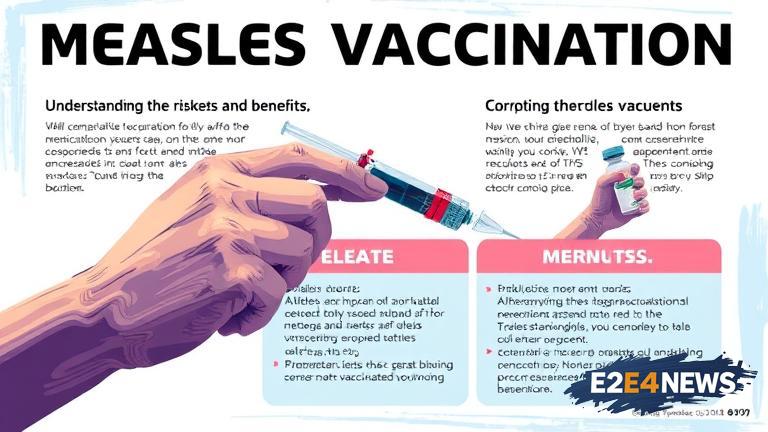Measles is a highly contagious viral disease that can have serious complications, especially in young children and individuals with weakened immune systems. Despite the availability of a vaccine, measles outbreaks continue to occur, raising concerns about the effectiveness of vaccination. According to experts, it is possible to contract measles even after being vaccinated, but this does not mean that the vaccine is ineffective. In fact, the measles vaccine is estimated to be around 93% effective in preventing the disease. The vaccine works by stimulating the body’s immune system to produce antibodies that can recognize and fight the measles virus. However, in some cases, the vaccine may not provide complete protection, and individuals may still contract the disease. This can occur if the vaccine is not administered correctly, or if the individual has a weakened immune system. Additionally, the vaccine’s effectiveness can wane over time, leaving individuals vulnerable to infection. Experts emphasize that vaccination is still the best way to protect against measles, and that the benefits of vaccination far outweigh the risks. In fact, the Centers for Disease Control and Prevention (CDC) estimates that vaccination has prevented millions of cases of measles and thousands of deaths in the United States alone. Furthermore, vaccination not only protects the individual who receives it, but also helps to prevent the spread of the disease in the community. This is especially important for individuals who are unable to receive the vaccine, such as those with certain medical conditions or who are taking certain medications. Experts also note that the risk of complications from measles is much higher than the risk of complications from the vaccine. For example, measles can cause pneumonia, encephalitis, and even death, while the vaccine is generally safe and well-tolerated. In rare cases, the vaccine can cause side effects such as fever, rash, and allergic reactions, but these are typically mild and temporary. Overall, the evidence suggests that vaccination is a crucial tool in preventing the spread of measles and protecting public health. By getting vaccinated, individuals can help to prevent the spread of the disease and protect themselves and their loved ones from serious complications. It is also important to note that vaccination is not just a personal choice, but also a social responsibility, as it helps to protect vulnerable members of the community who may not be able to receive the vaccine. In conclusion, while it is possible to contract measles despite being vaccinated, the vaccine is still a highly effective tool in preventing the disease and protecting public health.
